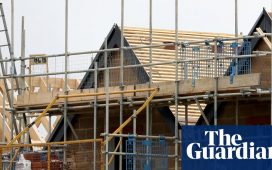Stay informed with free updates
Simply sign up to the Property sector myFT Digest — delivered directly to your inbox.
The typical economic misery index is created by adding the unemployment rate to the inflation rate.
For Britain’s renters, this might be more appropriate:
Or this:
Or (Ingerland only, soz) this:
As many (predominantly younger) people whose tenancies are tied to the start of the university term cycle prepare to swallow a fresh jump in prices — or lower their expectations — one question will be on many minds: are rents going to get lower soon?
No. Ok, well, very likely not.
How about this instead: are rent going to stop getting higher quite so quickly soon?
Maybe, says Deutsche Bank’s Sanjay Raja:
There’s reason to be optimistic that rental inflation will start to subside by later in the year.
First, RICS detailed data suggests that tenant demand for properties has died down significantly since the onset of the pandemic. In fact, rental demand dipped into negative territory at the end of last year and remains well below its long-run average. New landlord instructions have also started to show some signs of improvement in recent quarters. While still below normal levels, we could see a pick-up in new instructions by H2-24, absorbing some of the ‘excess demand’ in the market.
Second, demand for buy-to-let properties has picked up. According to the Bank of England’s Credit Conditions survey, lenders have started to up their expectations for buy-to-let mortgages, with H1-24 data looking fairly strong. Forward-looking expectations also point to further increases in demand for buy-to-let mortgages. The Building Society Association reported its 6th largest single quarter increase in investors looking for buy-to-let properties.
Third, multiple property sources point to a slowdown in rental inflation. For one, HomeLet data show that after having peaked at over 11% y-o-y in late 2023, annual price inflation is on the way down, sitting currently closer to 5% y-o-y. Zoopla’s own rental market report suggest that prices are running at 6.6% y-o-y as of June 2024 (after hitting a peak of 16% in Q4-24), but rents for new lets are expected to “rise more slowly this year”. A similar view was echoed by Rightmove which noted that rent inflation hit 6.8% y-o-y, slowing from its peak of 16% in the last couple of years. The ONS’ own public opinion and social trends survey have also pointed to a softening in mortgage/rent increases experienced by households in the last month (July marked the lowest reading we’ve seen going back to Feb-24). And lastly, rent expectations, 3-months ahead, from RICS suggest a tempering in price inflation. From its post-pandemic peaks, rent expectations have slowed from its peak of near +65 to now +38. While not quite back to its pre-pandemic levels, the data points to some disinflation ahead.

(Disinflation — a slowdown in the pace of price increases — is sadly not the same thing as deflation, where prices actually go down.)
The other argument for a normalisation in rent increases is that it would be, well, normal: “rents prices ultimately tend to track headline inflation – with a lag”, notes Raja:
So far, the jump in rental inflation has been linear – and partly driven by methodological changes to how how private rents data are collected. But ultimately, as inflation normalises, private rental inflation will too. In fact, there have only been two periods in the last two decades where private rents CPI tracked above headline CPI (one around 2014-2016 and now). These tend to be anomalies rather than the norm. With the private rents-headline CPI wedge now extending 5.6pp, we’d expect to see a swift correction over the next year or so.

If rental inflation is heading for slow then steady, it’s worth further interrogating the mechanics of why.
Obviously buyers are notionally price-setters in the rental market, but it’s not like buying chocolate or a new laptop: most tenants don’t have a choice between renting or not renting.
In addition, initiating the renting process takes place under circumstances with significant pressure — households often form late (particularly, we’d imagine, around this time of year), flat-hunting can be hugely time-consuming, and the process is rife with information asymmetry.
This puts a lot of power, however much many may protest, in landlords’ hands. If they whip themselves up into a rent-hiking cycle, there is not a lot tenants can do.
Which is great for the Bank of England, whose rate-setters seem to have accepted that renters are a useful conduit for transmitting monetary policy. By hiking interest rates over recent years, they drove up the cost of mortgages, increases which landlords have evidently been able to pass on to renters — roughly a fifth of the population, a fifth that is usually younger and poorer.
Incidentally, here’s the BoE Monetary Policy Committee’s latest view on rent, from the August Monetary Policy Report:
Demand for rental properties continues to cool, although supply remains constrained. Rental price inflation has slowed, and some estate agents are reporting a rise in rental arrears.
As we’ve mentioned in a few pieces now, the structure of the UK’s modern mortgage market — dominated by 5- and 2-year fixed-rate products — effectively bakes lag into the transmission process: costs only go up when it is time for the product to be renewed. Even assuming rates continue to go down from here, that suggests there will be several more years of people having to pay a higher rate when they renew. That would imply a lot more rental inflation is yet to filter through. So, if it isn’t, why not?
Greed, maybe. As we see it, there are three possible paths:
1) Rent increases steady out from here, which would suggest that many landlords simply increased their prices in line with the market before actually experiencing an increase in their own costs. Nice work if you can get it.
2) Rent inflation remains elevated versus inflation and wage growth, which would suggest landlords are continuing to encounter and pass on large mortgage increases as their fixes lapse.
3) The squeeze on renters and supply has been too much, and prices flatline or even fall from here.
We strong suspect 1) is the most likely path, which will suggest a great many landlords opportunistically used the inflationary environment as cover increase their income despite not yet facing mortgage cost increases. That’s an unlovely consideration for renters, but is a lot less concerning than 2) would be. As for 3)… maybe. Probably not. Sorry.
As the UK begins what might well be its slowest-ever cutting cycle, higher rental costs are probably here to stay.
Further reading
— Andrew Bailey vs the renters?













